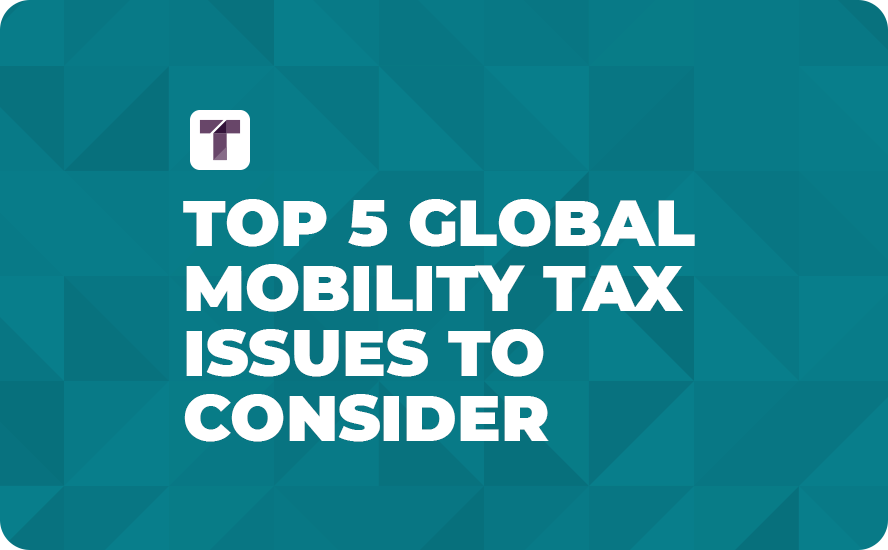Are you a diverse and global tech company? Are you looking for ways to become more global and embrace a remote workforce? Global mobility – which is often defined as employee relocation – is when companies transfer or employ individuals in multiple countries. The advantages of a remote and global workforce are immense – but do not come without their own set of challenges
Key challenges that global companies face are related to taxes and how they apply to employees located across the world. Tech companies that employ a global workforce can face financial and economic penalties when they are not compliant with employment laws in emerging markets. Here at TRUSS – we want to help you build and manage a global workforce and to help you understand the tax-related challenges, we have created a list of the Top 5 Global Mobility Tax Issues to Consider.
Contact the TRUSS Team today to learn more about our services and prices for global tech companies!
READ MORE: What Is Payment in Lieu of Notice?
What Are the Tax Challenges for a Global Workforce?
Taxes and employment laws are different across the globe and it is important for global companies to adhere to these laws and remain compliant. TRUSS provides a global employment platform that will help you find, recruit, hire, and manage talented employees in Central Asian countries that include Uzbekistan, Kazakhstan, and Georgia. TRUSS has the ability to serve as your employer of record in Central Asia and will help you manage employee payroll and remain compliant with local tax laws.
Here is a better look at a few of the tax challenges that U.S.-based tech companies will face when they hire a global workforce in Central Asia.
1. Tax Residency
Where are you or your employees legally obligated to pay taxes? Tax residency is a company or employee’s legal tax status in a country. It is the responsibility of the employee to declare their tax residency – but companies can provide support and protection that can prevent employees from paying additional taxes. Incorrect tax residency declarations can result in fees or penalties.
2. Double Taxation
Many countries have Double Taxation Agreements (DTAs) with economic partners that prevent employees from paying income and property taxes in multiple countries – which is important for global tech employees employed by U.S.-based companies. These laws are in place to increase trade and business between countries across the globe. When you employ a global workforce, it is important to know and understand if there are Double Taxation Agreements in place.
3. Tax Equalization
Tax equalization is a strategy employed by global employees to help ensure that employees pay the same level of taxes that they would in their home country – to provide neutral taxation – by the employer taking on any excess tax obligations. TRUSS provides a comprehensive platform that will help U.S.-based tech companies who hire across the globe account for tax equalization with their payroll.

4. Taxation of Employee Benefits
When you hire abroad in countries like Uzbekistan, Kazakhstan, and Georgia, the employee benefits – paid time off, insurance, and 401K options – are all different and may be taxed at different rates than those in other regions around the world. Tech companies that hire in Central Asia, need to be aware of how employee benefits are allocated and taxed to remain compliant with local labor laws.
5. Permanent Establishment
A Permanent Establishment (PE) is when a business or company has a consistent presence in a foreign country and may be liable to pay additional taxes in that country. Tech companies that hope to open an office in a different country or employ a global workforce need to be aware of the tax implications of a Permanent Establishment that include tax liabilities, employer liabilities, and more.
READ MORE: 3 Ways to Run Global Payroll
How Can TRUSS Help with Remote Employee Tax Issues?
When you choose to hire a remote and global workforce with the help of TRUSS, it is vital that you understand the tax implications and tax issues that you may encounter along the way. Even with an understanding of how taxes work in the United States, the tax laws in Central Asia and other emerging markets may prove to be complicated and with a global team, it is important to know which taxes need to be paid.
TRUSS can help alleviate some of that stress and can function as your employer of record in Central Asia and will help you manage payroll, taxes, paid time off, and much more. We have an experienced team located in Central Asia that knows the ins and outs of the local labor laws and will help you remain compliant and aware of any potential tax issues.
Contact the TRUSS Team today to learn more about how we can help you with the Top 5 Global Mobility Tax Issues!

